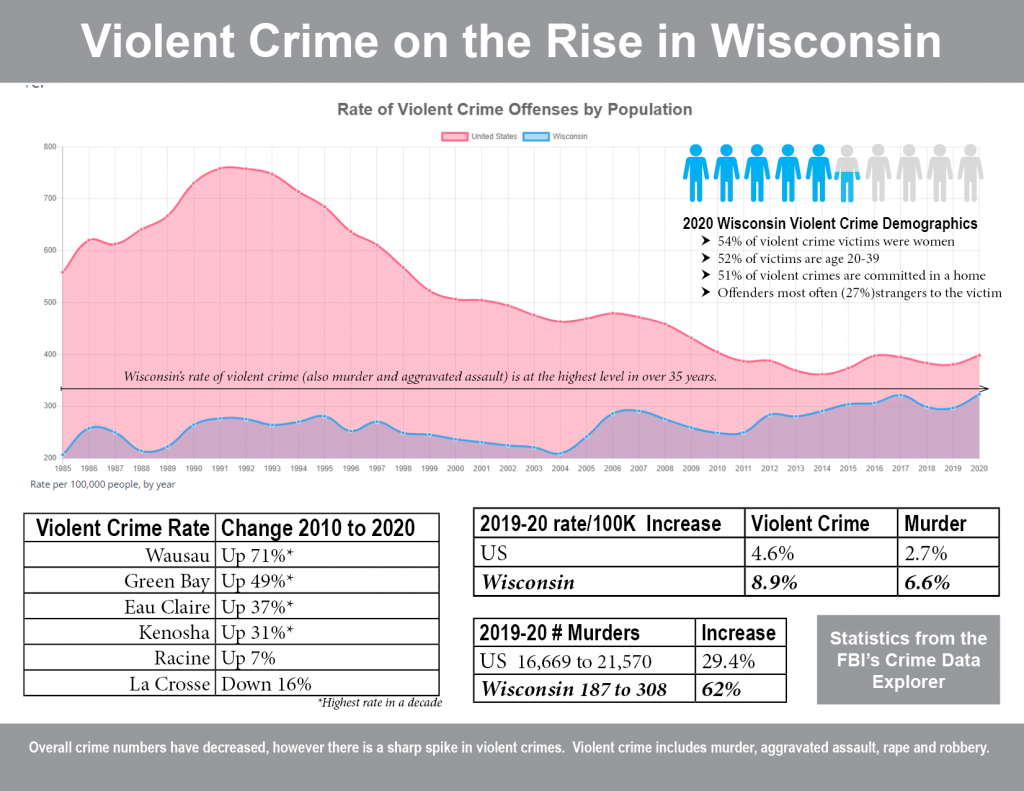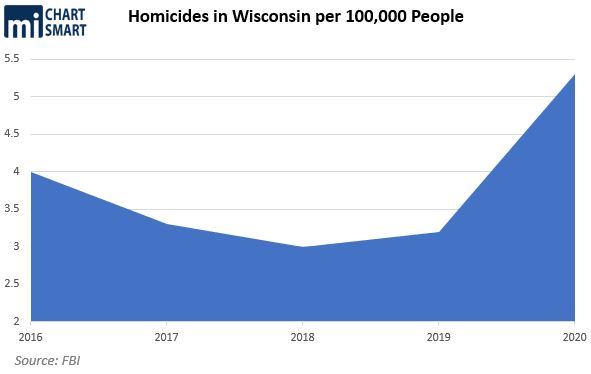
The media refuses to analyze or even discuss the issues that concern Wisconsinites the most – inflation, crime, or education
Here is a look at the media bias and how it is impacting the debates
A new Marquette Law School Poll is out this week and again shows that crime and inflation again rank at the top of concerns for Wisconsin voters cutting across party lines.
The September Marquette poll determined that inflation and public education rank within the top 5 issues that voters share concerns about across party lines. But Independents and Republicans share 4 of their top 5 concerns, with crime being in the top 3 for both, while that issue didn’t even make the top 5 for Democrats. Climate change was the top issue of concern for Democrats in September, tied with gun violence, but the poll dropped this issue in October. We look at the issues that rank among the top concerns of voters broadly, not just the ones they say they are ‘very’ concerned about; the level of concern (very, somewhat) measures intensity of concern, not if it is an issue of concern.
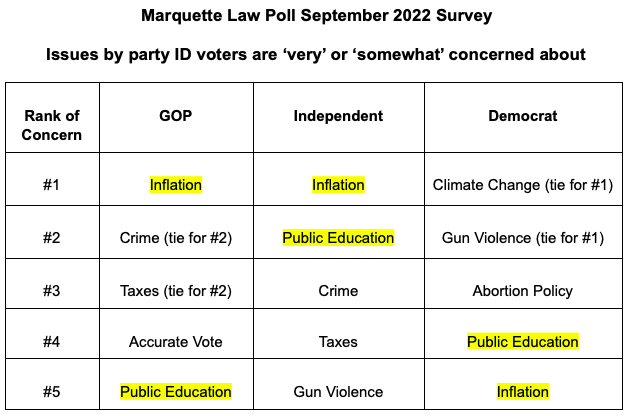
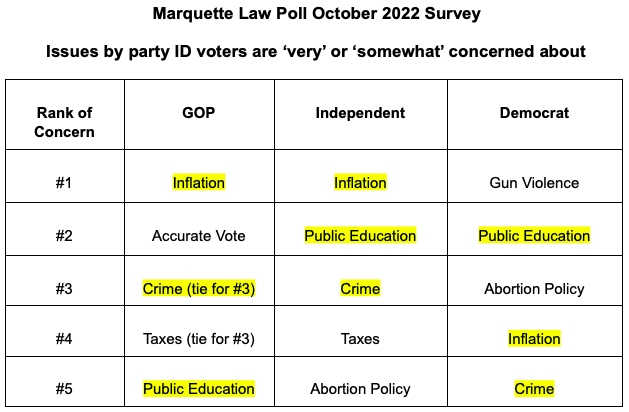
Note: climate change was not polled on in October
Why do these issue rankings matter in relation to debate questions? If debates are to address issues that help voters decide which candidate will best represent their concerns, the top issues of the day have to figure in.
That’s not what happened in the WBA debate.
There were 17 questions asked by members of the mainstream media. As you can see, not a single question on inflation and the public policy decisions that have produced historic inflation. Not a single question on rising violent crime and murder rates and the policy decisions that have resulted in this mayhem. Not a single question on the decline in education or the damage Covid virtual learning did to our kids. In fact, looking at the top issues of concern in the tables above, they covered all 5 of the Democrats’ top issues but only 3 for Independents and Republicans. When the reporters did turn to the top concerns of the public in general, the question was couched in such a way as to shift focus away from the root cause of the problem, i.e., scold and release sentencing has led to a dramatic increase in violent crime, and, instead, force the conversation to liberal-friendly talking points – guns are the problem. This inherent bias in how the questions were posed further skewed the debate left of center.
- The very first question was about marijuana legalization. The first question of the debate isn’t about one of the biggest problems we face in this country or a top concern of voters; the first question is about marijuana. Runaway inflation, out-of-control crime, rising murder rates, our children’s dismal academic performance, an economy in recession, and the first question is about…marijuana. At a time when – according to the Marquette Poll – 46% of Wisconsinites are struggling or just getting by, and 1 in 5 worry about their safety simply going about their daily activities, one wonders if the mainstream media reporters charged with asking questions are unfamiliar with Maslow’s Hierarchy of Needs. No one challenged Barnes when he said that marijuana is harmless or asked him about the problem that if you legalize it for adults, marijuana will be more prevalent in our schools and have a greater impact on our children.
-
Only one question touched on inflation. It was less a genuine question about what policies need to change to stop inflation and more of an assertion by a La Crosse radio reporter that the government needed to increase the minimum wage to help Americans cope with the historic inflation their government caused.
- Inflation ranks in the top 5 across party lines. The nation currently has the lowest number of minimum wage workers in history, and only 1.6% of Wisconsin workers make minimum wage. To approach inflation as a problem only for those who make minimum wage ignores its impact on over 98% of hourly workers who are struggling to pay their bills because of policy decisions made at the national level that drove generationally high inflation levels.
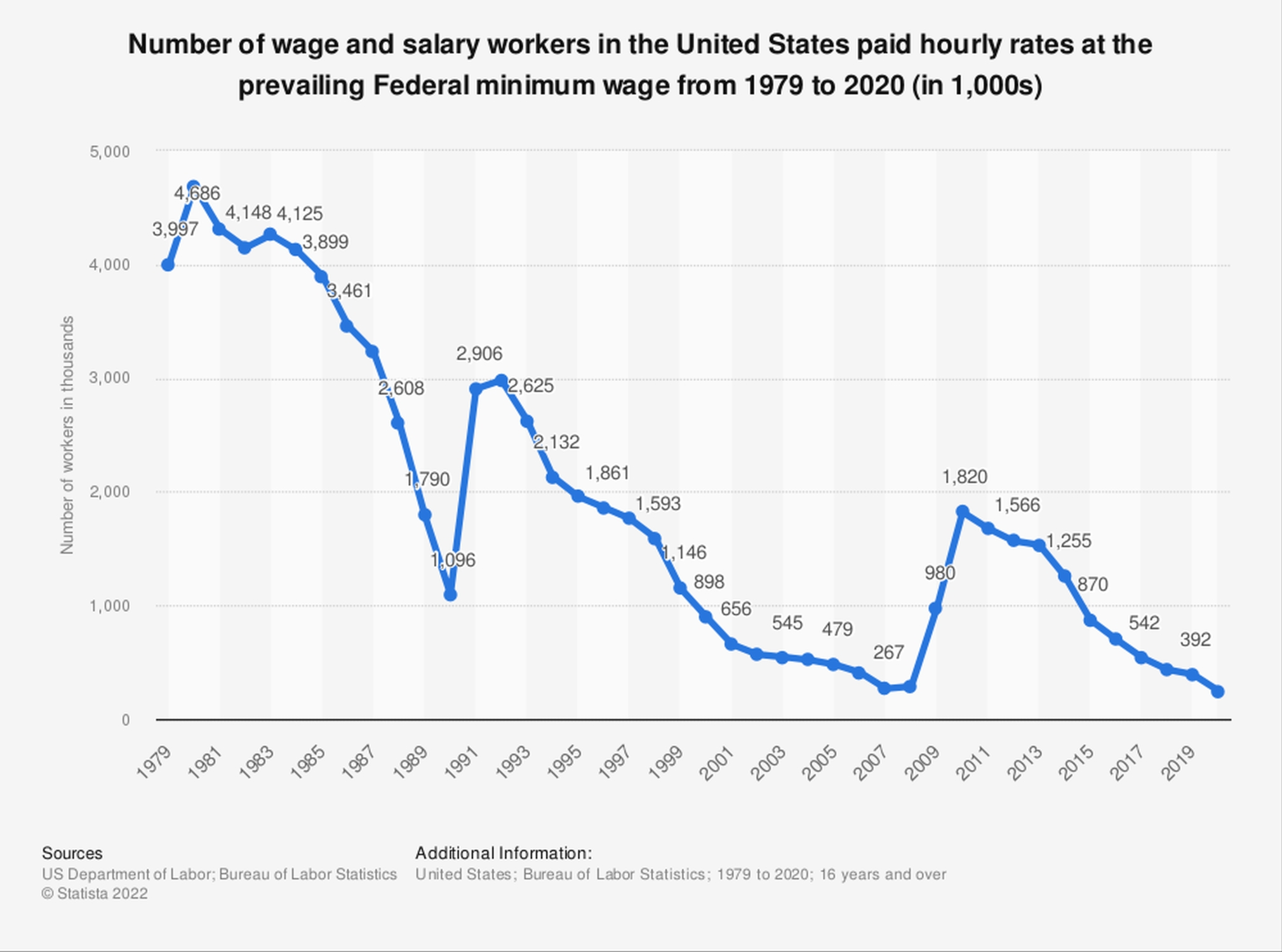
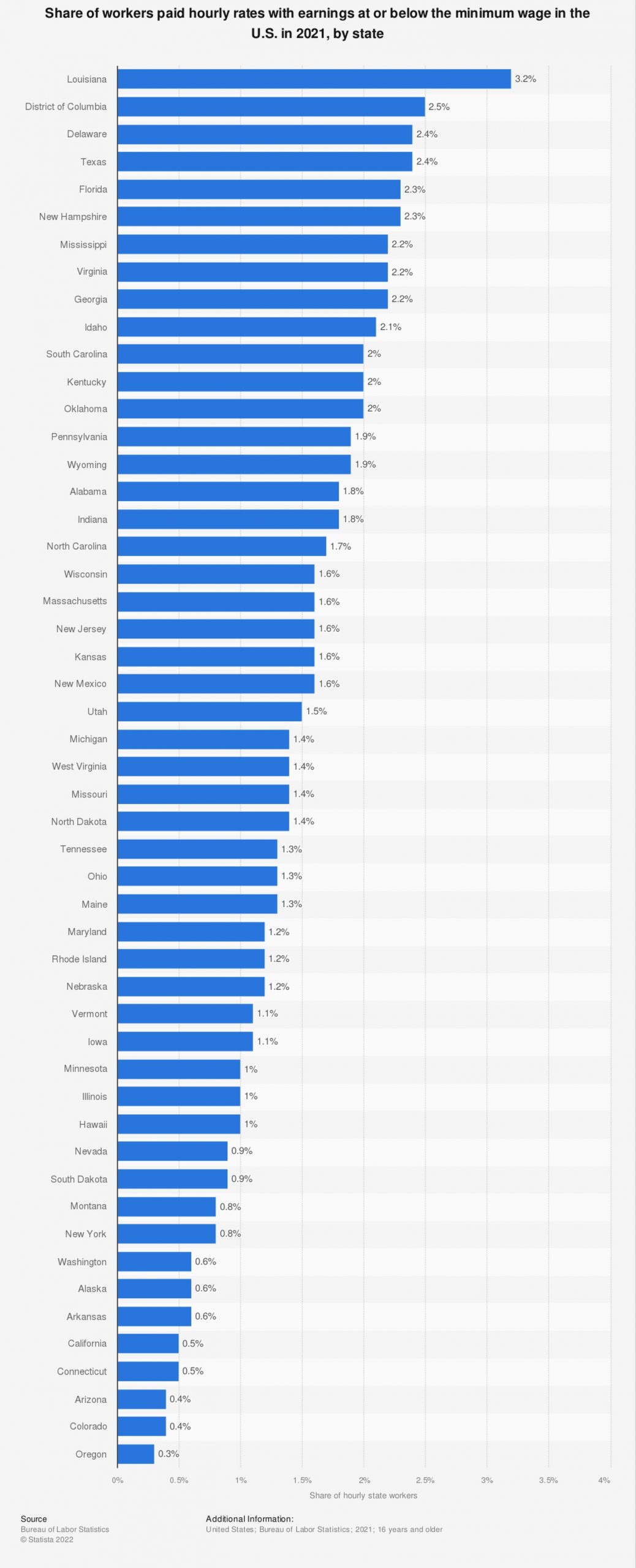
-
Nothing from the reporter about the policies that have led to inflation – reckless and unnecessary government spending, policies that allowed people, specifically able-bodied, childless adults, not to enter the workforce, etc. Or $2 trillion in unnecessary spending to combat Covid when it was already declining, $740 billion in new spending in the Inflation Inducing Act that will only make it worse, etc.
-
In the earlier Democrat debate, Barnes’ answer on inflation was evasive. Moderator: How has inflation impacted you personally? Barnes: I know the impact of inflation firsthand (chuckle) there’ve been a number of stories written about my challenges… We need to hold companies accountable for using inflation as a smokescreen to jack up prices. Barnes owns two homes. In addition to being delinquent on his property taxes, he also didn’t pay income taxes in 2018, and as an able-bodied working-age adult without children, received taxpayer-funded Medicaid while his campaign picked up his expenses, and he used apparently hefty savings to purchase not one but two condos between 2017 and 2019. He didn’t pay bills, including his taxes. This was when inflation was under 2%, years before we entered the inflationary spiral brought on by the Biden Administration. Barnes is rewriting history, using inflation as a smokescreen to fake a connection with families who are actually struggling to pay their bills, then shamelessly pointing fingers at others he claims are using inflation as a smokescreen to overcharge.
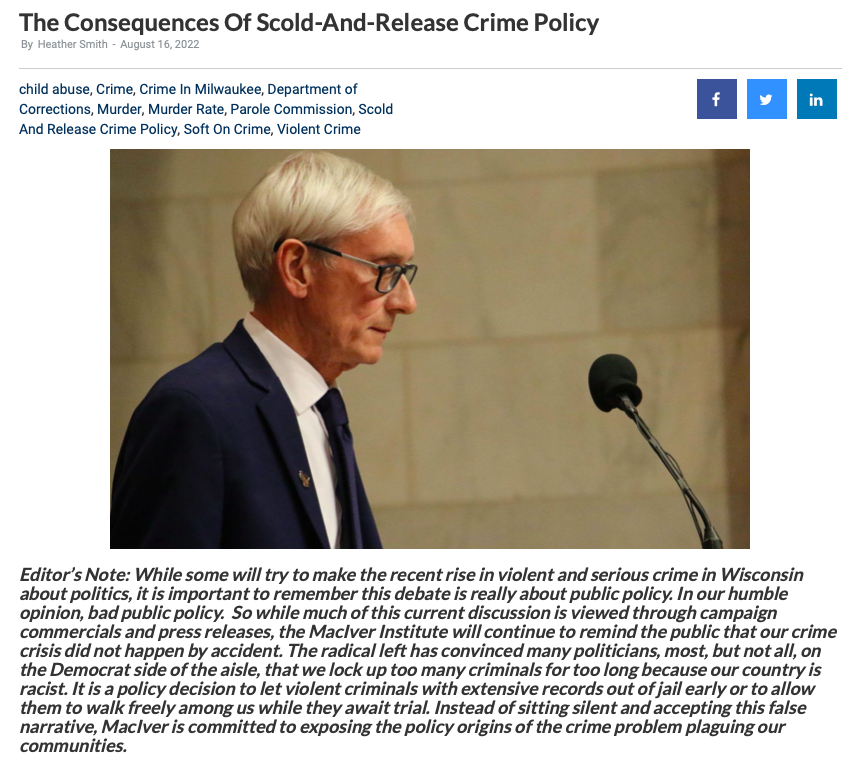
-
The questions on the issue of crime focused on the unfairness of criminals being subject to cash bail and Milwaukee spending more money on their police than any other item.
-
No mention of how the far left is pushing largely Democrats to adopt criminal justice reform all over the country that:
-
Ends the basic premise that an individual is responsible for a crime he/she committed and should be held accountable for that crime because it is racist to do so.
-
Ends cash bail, keeping dangerous criminals out on the street while awaiting trial, as was the case with Darrell Brooks.
-
Implements scold and release sentencing. Governor Evers proposed a “wholesale rewrite of Wisconsin’s criminal code” in his 2021-2023 state budget. The Evers/Barnes proposal would have dumped Truth in Sentencing, reduced sentences in general, and expanded early release along with a slew of other warm fuzzies for felons. One of the proposals called for consideration of dialing down sentencing for criminals up to age 25 – as if we don’t already have a major problem with juvenile crime – because the brains of 25-year-olds aren’t developed enough to understand murder is frowned upon.
-
Makes significantly reducing the prison population an immediate goal. Gov. Evers promised during the Democratic primary debate in 2018 to reduce our prison population by 50% and, so far, the Evers Administration has freed 15%. We have reported on several examples of charged criminals set free to commit more crimes. WI Right Now has published numerous examples of dangerous and violent individuals released from prison by the Evers Administration. Not one earned a mention by the reporters.
-
While Barnes said that “under my plan, dangerous people don’t get to buy their way out of prison”, the plan Barnes authored in the legislature said explicitly that judges could NOT use the nature of the crime(s), the number of crimes or the gravity of the crime(s) to set bail, meaning that Darrell Brooks would have been allowed back out onto the street despite attempting to kill someone with his car.
-
No mention of liberal District Attorneys often dropping gun possession charges in plea deals or their reluctance to crack down on straw purchasers.
-
Barnes is heavily backed and bankrolled by the defund the police movement and was a vocal supporter of the movement, criticizing bloated police budgets and whiny cops. Now he’s extremely careful to stick to a particular phrase – that police should ‘have the funding they need to keep us safe’ – which could mean any level of funding, including massive cuts. The reason for his cautious phraseology is obvious: Wisconsin voters do not support defunding the police, especially as violent crime spiked across the state last year, and continues to escalate. But as Empower Wisconsin reported, Barnes’ biggest bankroller is a group committed to defunding the police. And many other groups that support Barnes also support efforts to stop the enforcement of our laws, reduce the number of law enforcement officers, let more felons back on the streets, and generally just be nicer to criminals in the hope they will stop being so crime-y. Much of the PAC support comes from Defund the Police groups. The newly-minted Courageous Leaders super PAC dedicated solely to supporting Barnes, funded with over $1 million from California mega-donor Karla Jurveston, a major funder of Defund the Police and Abolish ICE candidates, has just started spending in Wisconsin.
-
WKOW’s reporter didn’t seem to know one of the major reasons Milwaukee spends so much on police while maintaining a stunningly high crime rate is that the Milwaukee County DA refuses to prosecute 60% of felony arrests and 80% of misdemeanor arrests made by police. Nor did he seem to be aware that salary adjustments for the police force are determined by collective bargaining, and the size of the police force is being reduced while the budget increases.
-
In general, there was no attempt to push Barnes to clarify his too-carefully-parsed explanations of his past positions about defunding the police, or to indicate his support or opposition to his administrations’ hundreds of discretionary paroles that have put violent criminals back into our neighborhoods.
-
-
Similarly, one reporter blamed climate change for Hurricane Ian (as though hurricanes were a new phenomenon) and asked for “solutions” to climate change. The reporter did not seem to be aware of the Barnes’ Climate Change Task Force recommendations to make the state carbon-free and to disincentivize the use of oil or gas through increased prices. These policies would jack up prices at a time when inflation has already caused a steep spike in the number of families struggling.
-
As the top issue concerning Democrat voters, a climate change question is reasonable.
-
However, since the issue is not a top concern for any other group and Barnes’ substantial record on the topic includes dismantling capitalism, increasing the price of gas to disincentivize its use, a focus on racial justice, and making the state carbon free which will drive energy prices and heating costs sky high, a more relevant question might have involved the ability of voters to sustain the burden of the costs he proposes. Or even whether the candidates believe capitalism killed the 100+ people who lost their lives in Ian.
-
Barnes was asked at the Democratic debate earlier in the campaign how he would transition the economy to the New Green Deal without raising gas prices and home heating costs. Barnes did not answer the question directly.
- No mention of the Barnes Climate Change Task Force mandating higher gas prices to disincentivize its use, and the Evers-Barnes budget proposed an 8-cent-a-gallon gas tax increase on top of yearly hikes in perpetuity, which would have driven gas prices up more than 11 cents higher than it is today, according to the Legislative Fiscal Bureau. The goal of the Barnes Climate Change task force was to make the state carbon-free by 2050, which comes with huge costs, not only in higher prices to heat our homes and fuel our cars, but in higher taxes to finance new “incentives” and larger government to enforce the many new regulations. Wisconsin already has the second-highest residential and commercial electric rates in the Midwest, and even one of the task force members expressed concern about the “trillions” in new state and federal spending being proposed.
- Further, an enterprising, fair-minded reporter who took time to research might have learned that according to statistics on North Atlantic Hurricanes from the Colorado State University’s Department of Atmospheric Science:
-
Between 1850 and 2021 there were 945 hurricanes, 328 categorized as majors.
-
In the 25-year span from 1945 and 1969, 6 years had 4 or more major hurricanes; in the following 25 years, from 1970 to 1994, no year had 4 or more majors.
-
1893 logged 5 major hurricanes; 2021 logged 4 majors.
-
In the last 128 years, only 8 years had more hurricanes than 1893, and 3 of those years were 1950 or before.
-
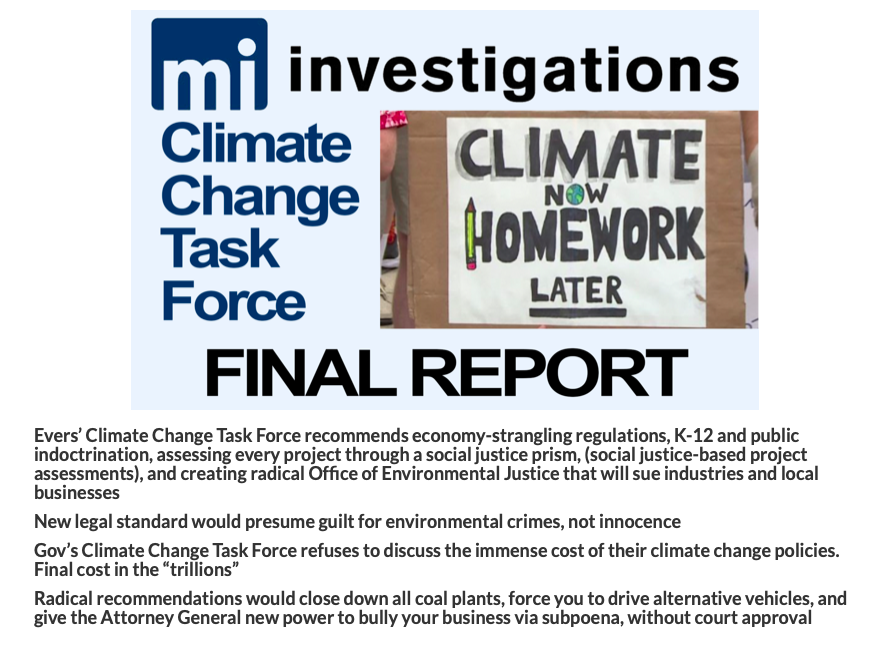
-
Student loan forgiveness represented 12% of the total number of debate questions, and they focused on fairness and the racial wealth gap.
-
The question on fairness was apt but lacked depth and follow-up. For decades, college has been pushed on high school graduates as a means to earn more, with debt being far outweighed by increased earnings:
-
Bachelors degree holders’ median earnings are 84% higher than a high school graduate.
-
Average student debt is around $28,000 (including only the 55% who graduate in debt) and the increased lifetime earnings for a bachelor’s degree compared to a high school graduate are $1.2 million.
-
Is college “unaffordable” when 45% of students do not take out student loans for their undergraduate degrees and among the 55% who take out loans, families earning higher incomes take out more debt?
-
40% of student loan debt is for graduate school and 56% of all debt is held by households with at least one graduate degree.
-
Lifetime return on investment for a master’s degree is 434% making this group the most able to repay debt.
-
-
-
One reporter asked about abortion, a driving issue in this election cycle. Yet when Barnes refused to answer when he believes life begins, he was not pushed to answer.
-
The question on gun control was focused on the need for more laws, like an assault rifle ban and mandatory background checks (already law in Wisconsin for every retail/dealer purchase.) But the reporter didn’t address the problem of DA’s who won’t prosecute the gun control laws on the books, or the ineffectiveness of red flag laws across the nation. New York state has some of the strictest gun control laws and yet the Buffalo grocery story mass shooting occurred there.
-
Immigration was addressed only as it relates to the workforce. While that is one important component of the immigration debate, the fundamental concern is obviously about having control of the border to assure a legal immigration process for public safety, but also because while we are a nation of immigrants, we are also a nation of laws. According to the way the issue was framed, an open border is not a crime issue, national security issue, human trafficking issue, or illegal drug issue; it is a workforce issue. As crime is uppermost in the minds of voters, the crime of illegal immigration has to be discussed in that context as well.
-
One question on gas prices and OPEC’s recent decision to cut production.
-
No mention of the Keystone Pipeline, President Biden’s public campaign pledge to end fossil fuels, the President’s restrictions on domestic drilling or oil and gas permits, the fact that the United States was a net oil exporter under the previous administration, etc.
-
Again, no discussion or even mention of Barnes’ track record pushing for higher gas prices and home heating bills. Barnes was asked at the Democrat debate earlier in the campaign how he would transition the economy to the New Green Deal without raising gas prices and home heating costs and Barnes did not answer the question directly.
-
No mention of the Barnes Climate Change Task Force mandating higher gas prices to disincentivize its use, and the Evers-Barnes budget proposed an 8-cent-a-gallon gas tax increase on top of yearly hikes in perpetuity, which would have driven gas prices up more than 11 cents higher than it is today, according to the Legislative Fiscal Bureau,
-
No mention of Barnes saying we needed to “stymie capitalism” to achieve his climate goals at the United Nations Climate Conference in Madrid in late 2019.
-
The goal of the Barnes Climate Change task force was to make the state carbon-free by 2050, which comes with huge costs, not only in higher prices to heat our homes and fuel our cars, but in higher taxes to finance new “incentives” and larger government to enforce the many new regulations. Wisconsin already has the second-highest residential and commercial electric rates in the Midwest, and even one of the task force members expressed concern about the “trillions” in new state and federal spending being proposed.
-
-
Miscellaneous questions about the Electoral College, PFAs, Respect for Marriage Act, broadband, and the unpopularity of the Supreme Court made up over a quarter of the questions and took time away from the opportunity to have candidates address, in some detail and not a 30-second spin, their positions on the issues that are foremost in voters’ minds.
In the debates to come this week, we believe the following questions deserve to be asked of both the gubernatorial and senate candidates:
Inflation
-
What do you think are the 3 drivers of the generationally high inflation voters are suffering under?
-
What specific actions can be taken from the position you’re seeking to address those three issues, and how, specifically, do you plan to make those actions happen if elected.
-
Do you agree with President Biden’s handling of the economy, and what would you do differently, if anything?
Education
-
What do you believe the purpose of public schools is?
-
Governor Evers and Superintendent Underly tout our schools as 8th in the nation when most students cannot do basic English or math at their grade level. What would be your message on our schools – that they’re doing great or that they’re struggling to fulfill their basic responsibility?
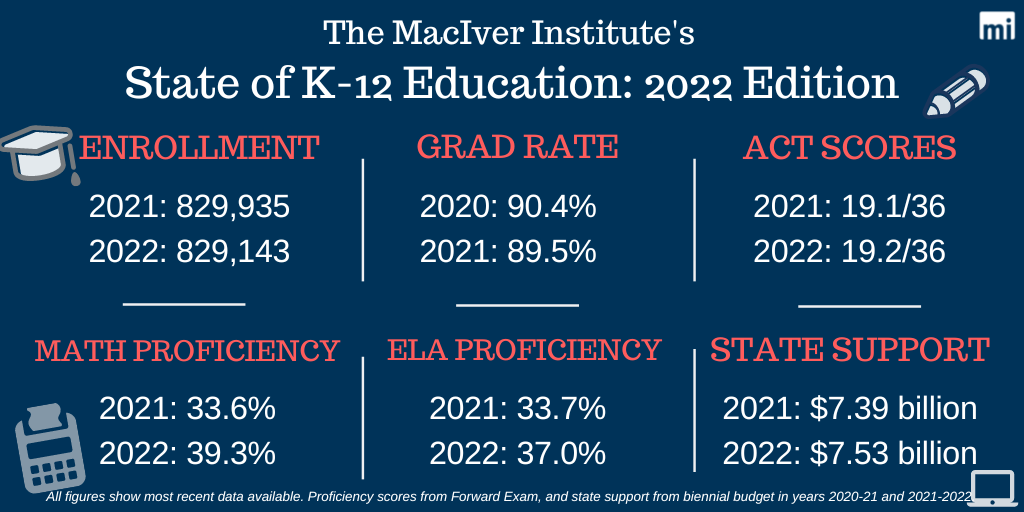
-
With school funding continuing to increase while enrollment has dropped precipitously, simply focusing on more school funding seems to ignore basic realities. What, aside from more money, can be done to bring schools back to the basic mission of preparing students to be proficient in basic subjects as a foundation for their future?
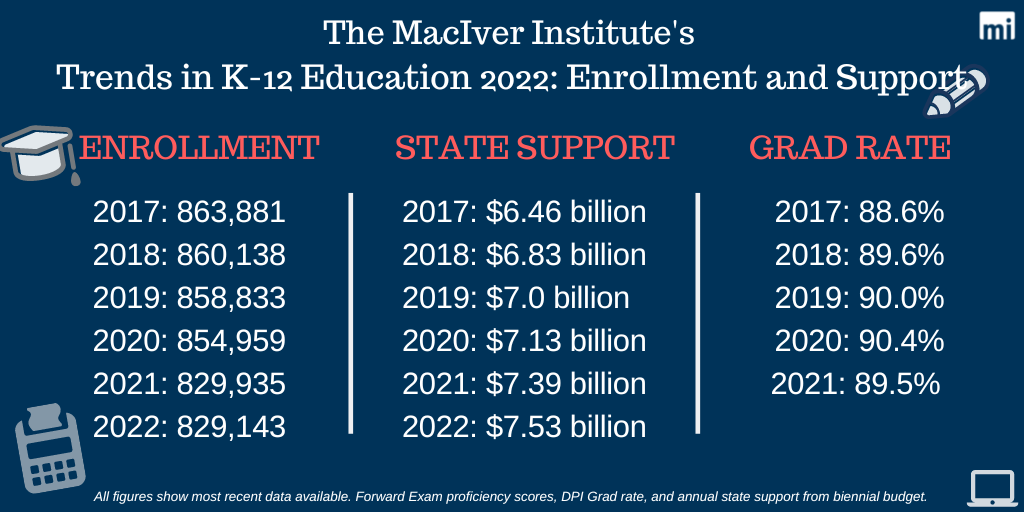
-
What should be done, specifically, to flip the proficiency scores so that most students are at or above grade level instead of failing, as they are currently?
-
Do you believe that CRT should be used to develop curriculums in school, encouraging students to view everything through the prism of race, where whites are oppressors?
-
Do you find the hypersexualization of school classrooms, discussions, and readings appropriate for education?
-
Do you believe that schools have the right to keep a child’s health and social struggles hidden from parents?
-
Do you think that the increasing focus on equity, gender, and sex are contributing factors in the decline in proficiency of students? For example, do you think that the time spent on Kindergarten gender studies might be better utilized to teach early literacy?
-
Do you believe school districts and teachers should pass and advance children who have not met basic proficiency requirements for their grade level (end social promotion)?
Crime
-
What are three specific causes you believe are driving the spike in violent crime, and what are your solutions to reverse the trend?
-
Some, at the local level, have decided to reduce the number of criminals incarcerated (end bail) and to hand out lenient sentences for serious crimes in the name of criminal justice reform and critical race theory. Do you think the criminal justice system and law enforcement are racist?
-
Would you support policies to make it more difficult for prosecutors and judges to dismiss charges or plea bargain?
-
The violent crime rate continues to increase in Wisconsin, but more than 90% of violent crimes do not involve firearms, and a quarter of homicides do not involve firearms, so to suggest the violent crime spike will be solved by gun control ignores 90% of violent crimes. What solutions, other than gun control, do you have for violent crimes?
-
Where do you stand on expungement – hiding from the public record evidence that a person has committed certain crimes?
Gun Control
-
Would you support legislation that would require prosecutors and judges to prosecute those who violate the gun control laws already on the books to the fullest extent of the law? If not, what solution do you see to the problem of so many laws on the books being ignored by the justice system?
-
Does a red flag law violate the constitutional rights of an individual?
-
Do you support the federal funding being used to bribe states to enact red flag laws?
-
Red flag laws have failed to prevent gun crimes in states with such laws. Can you explain why their laws have failed?
Taxes/Spending
-
Taxes are a top concern for many Wisconsinites. The state and federal budgets continue to grow. Do you believe in higher or lower taxes, and why?
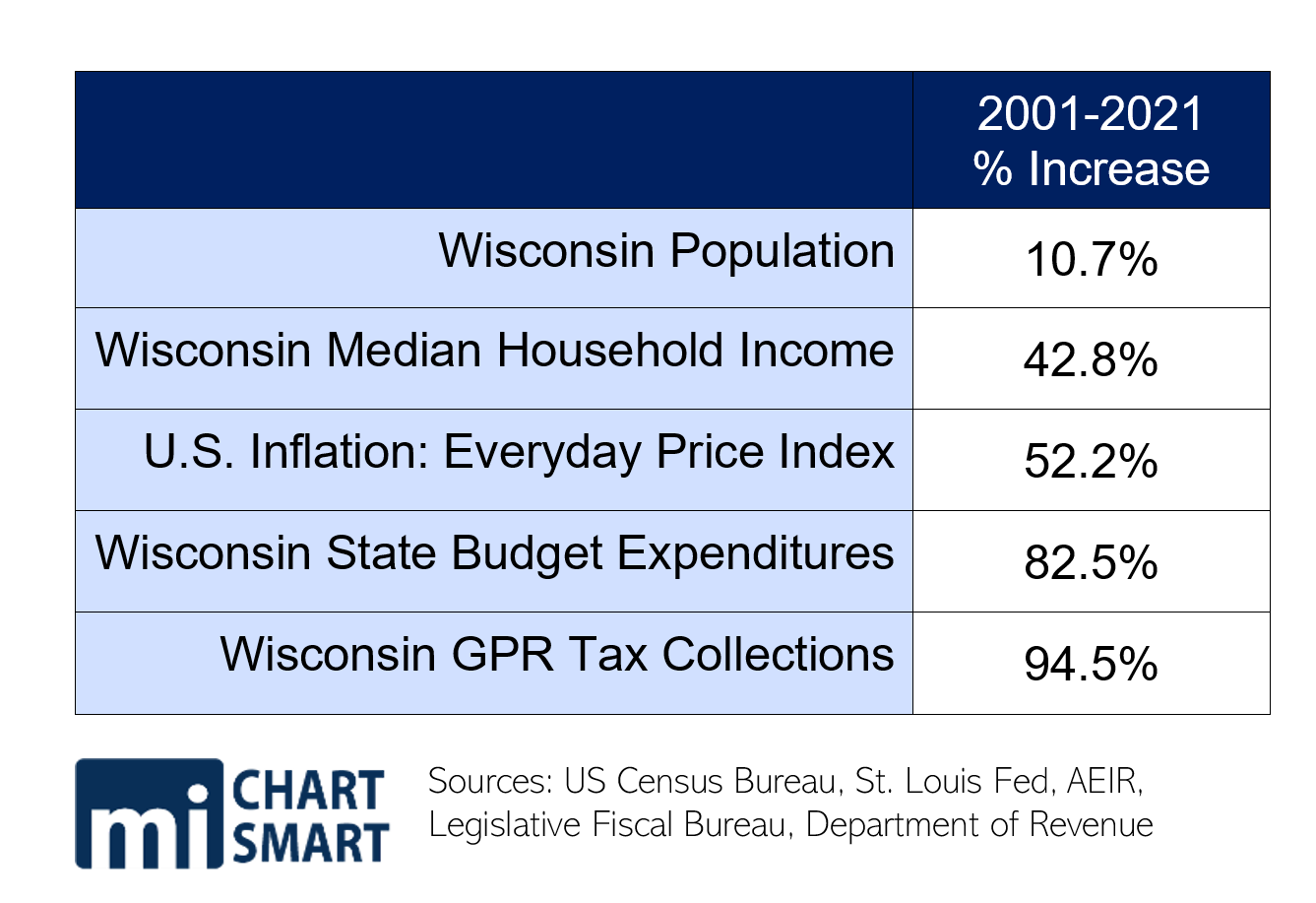
-
What is your position on tax swaps or shifts and the increased use of fees to fund government programs?
-
Do you believe there are inefficient or duplicative programs that waste tax dollars, and would you eliminate such programs? Name 2.
-
Wisconsin now has a quarter of residents on Medicaid, many of them no longer eligible. The asset test for MA is minimal, meaning that able-bodied, working-age adults with no dependents can have substantial savings and other assets and still take advantage of generous MA benefits financed by taxpayers who have much less wealth. The program is financed by both state and federal dollars, but with fewer than two people working to finance every person on Medicaid and health outcomes for the MA population worse than for those on private insurance, it’s clear that Welfare has become a Public Health Crisis both from the standpoint of outcomes and sustainability. What are your immediate and long-term solutions to this issue:
-
Would you support asset limits?
-
How and when – specifically – would you begin transitioning ineligible recipients off the program and into the Affordable Care Act exchanges?
-
Do you support a work, worker training, or education requirement for able-bodied, childless, working-age adults using Medicaid benefits?
-
-
Do you support tougher program integrity efforts to prevent provider fraud and overcharging? A recent public example is the millions defrauded from a program meant to improve birth outcomes for Black mothers and babies, but there are many hidden ways providers take advantage of the program. Give 3 specific examples of how you approach this expensive problem.
Election Integrity
-
It is an existential problem for democracy if electors cannot trust that their vote counts and that every voting precinct follows the law in the same way. What do you think needs to be done to restore faith in elections?
-
Do you think local clerks should be held accountable for following the statutes and not guidance from the Elections Commission when there is a conflict between the two?
-
What would you do to reform WEC?
-
Do you support voter ID? Would you support a return to all in-person voting with absentee voting allowed only with an excuse, as the law was for decades to try to avoid the potential for fraud and erosion of voter confidence inherent in early and absentee voting?
-
In the past several years, we have seen municipalities implementing state election law differently, resulting in votes that would be rejected in one municipality being counted in another, something that affords more weight to votes from some areas and strips weight from votes in others. Should every vote be cast and counted under the exact same rules, no matter where the voter lives?
-
Can federal, state, or local governments ignore state law or constitutional protections during a public health emergency? Can local public health officials?
-
When the CDC issues the next alarm over Covid infections this fall and winter, will you support a stay-at-home order and force businesses to close?
-
When the next virus hits the United States, what will be your plan to protect Wisconsinites from lockdowns and the shuttering of our economy?
Coercive Tactics of the Federal Government and Bureaucracy
-
Do you believe every disparate outcome is racism or a civil rights violation?
-
Do you believe parents should be labeled domestic terrorists by the federal government for asking questions of their local school district or government?
-
Would you push back against the federal Department of Justice’s attempts to scare or punish school districts that try to deal effectively with violent or unruly students? Would you represent such a school district in court if they were sued by DOJ?
-
The federal DOJ and the State AG’s office under Kaul have used the despicable tactic of sue and settle, where government lawyers target a business or an entire industry for political reasons and then use the power of their office to harass that legal business with a lawsuit to force a settlement. Usually, government lawyers require the accused to contribute money to a liberal cause or non-profit to make the legal threat go away. What will you do to prevent entrenched state prosecutors from pursuing this tactic?
-
What will you do to stop it at the local level or to protect a Wisconsin business from being targeted by the federal government?
